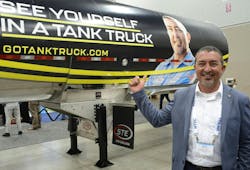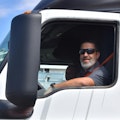Fully engaged: Powell targets mental health as NTTC ambassador
Dave Powell was going through the motions.
The veteran Usher Transport driver, and newly crowned National Tank Truck Carriers 2023-24 Professional Tank Truck Driver of the Year, had just learned he and wife Emily finally landed their dream home in Central Indiana, so his mind was elsewhere—in a very happy place—when he nearly lost his perfect driving record.
Fortunately, he reacted in time to avoid a collision, but the close call made him realize all distractions aren’t created equal—some are good, some are bad, some are physical, and some are beyond anyone’s control—but they’re all distractions, and more exist today than ever before. That’s why discussing mental health, and helping drivers find ways to stay focused on the road, is his top priority as NTTC’s ambassador.
“You have to keep a clear mind,” Powell said. “Twenty-three years ago, when I started, the only distractions in my truck were an AM/FM radio and CB radio. We didn’t have GPS, electronic logs, dashcams, or sensors telling us we’re following too close, and beeping at us. Nor did we have cell phones. If something bad happened, you didn’t learn about it until you got home, when you were out of the truck. Today, it’s lightning speed and our brains are trying to process everything. If we’re on the road and we stop for a couple hours, we’re looking at our phones, checking emails and texts. Everything’s at our fingertips, so our minds are processing so much more than when I started, and it’s a lot. And you have to stay focused when you’re driving.
“So I truly believe mental health is the starting point for enacting all the fundamentals we’ve learned. I’ve taken safe driving courses, I’ve been to the proving ground in Michigan, and completed all kinds of training. But if you’re 2 seconds too slow because your mind is in left field, it doesn’t matter.”
Questions and answers are edited for length and clarity.
Bulk Transporter: You transported refrigerated and flatbed freight before joining Usher in 2013. What led you to tank trucking?
Dave Powell: “I hauled fuel for Advantage Tank Lines, now part of KAG, for a little while, but I left when the economy slowed in 2008. So I always wanted to get back into gas, but I was still hauling steel when I moved from Ohio to where I live now, in Pendleton, Indiana. I didn’t know anyone there … but I knew people from back home who worked at Usher, and I always heard great things about them. So I talked to Usher for a year or so before I finally made the switch. They didn’t have a big footprint in Indianapolis and that worried me. But I liked the company’s philosophy, how they conducted business, how they treated their contractors—everything. It was more the workload that scared me. But things were deteriorating with the steel hauling, so I decided to give it a whirl. Eleven years later, I’m still here.”
BT: You said on stage you enjoy the home time, and the challenge of driving a tank truck. Why do you like about the challenge?
DP: “Hauling gas, you need mathematical skills. You must be able to calculate whether a load will fit, so there’s a lot on you to make sure the right product goes to the right place, and you’ve reconciled the gallons so the load will fit. And some places are unmanned. You could be delivering fuel to a gravel pit, and you only talked to somebody on the phone who said, ‘There’s the tank, this is the size, the tank gauge is up top, leave the paperwork in the mailbox beside it.’ So there’s a lot of responsibility.”
BT: You’ve only driven Peterbilt tractors in your career—a 1995 your grandfather helped you purchase, a 2004, and your current 2014 Model 389 you spec’d new and later rebuilt with a glider kit and Caterpillar engine. Why Caterpillar?
DP: “Because that’s all I’ve ever had. My previous Peterbilts had Cats. Cummins makes a great engine, too—they all do. But you get used to one, and you’ve got to drive them all a little different. Also, I’m good with my hands, as far as working on stuff, and I’m familiar with Cat systems. And they used to have a lot of hype. There are certain people who are diehard Caterpillar people. So they have good resale value.”
BT: You’ve been driving the truck for 10 years now, racking up nearly 500,000 miles on that replacement Caterpillar. What keeps you in it?
DP: “I’m a sentimental guy. I spec’d that truck and I’m the only person who’s ever driven it. And if I was going to buy another truck, I’d probably build the same one, and you can hardly get Caterpillars anymore. You can, but that truck’s going to cost almost double what it did 10 years ago.”
BT: What is one tip you give younger drivers to help them stay safe?
DP: “Treat every day like it’s your first. As time goes on, you do fall into a groove, and you can get lazy. It’s human nature. So, think about those things. Have a routine. Most people are trained well when they start, so don’t fall away from that, even when you’re more relaxed, and seasoned. Do the right things when no one is looking, and it usually pays off in the end.”
BT: We hear a lot about the transition to electric vehicles. As an owner-operator and fuel hauler, do you worry about abandoning diesel and ICE-powered vehicles?
DP: “No. I promote change. As humans, that’s what we do. We evolve. I mean, 150 years ago, we were riding horses around and look what we can do today. So electric doesn’t scare me, but I don’t think we’re ready for it yet. Do I think one day there’s a good chance we’re all electric, or maybe hydrogen or some other alternative fuel? Of course, because that’s what we do. But we’re not ready for it yet.”
BT: What has kept you at Usher for the last 11 years?
DP: “They’re awesome. In the transportation industry, overall, you get a lot of false promises, and they truly are an open-door, family-owned company. One cool thing we do is hold regular CDT [certified driver trainers] calls … with [Usher President] Ryan Usher, all our upper management, regional managers, our COO, Eric Mink, and safety personnel, and they usually end up lasting 2-2½ hours.
“We all have time to talk, we can bring up anything, and it’s not just letting drivers vent or raise concerns. They have real input into the changes that could affect them.
“So it’s just very open. Usher is truly a genuine company.”
BT: What does it mean to you to bring home the Usher trophy?
DP: “It’s awesome. I had a conversation with Bill Usher Jr. last year in Boston, and we talked about his dad, Ryan’s grandfather, and Ryan and Bill Sr. were very close. Bill Sr. gave Ryan the itch to fly, and Ryan is in the Air Force today. So I know how close they were, and being the first Usher driver to win the William A. Usher Sr. award is special.
“I’m prouder to bring it home to us than me because I think so highly of this company.”
BT: What is your goal as NTTC’s reigning tank truck industry ambassador?
DP: “I want to talk about safety, and drivers’ mental health, because it’s not really discussed. I’ve talked to a lot of drivers in 23 years, and I’ve asked them, ‘Do you hear about this in your company’s safety meetings?’ It’s a difficult topic, and it’s very gray and convoluted. It’s not black and white. You can’t track your mental health like your blood pressure. So, I don’t necessarily know how to navigate the issue, but I think the more we discuss it, the more people will feel open to considering what’s going on in their lives, good or bad. It’ll make it easier to say, ‘Hey, I’m a little off today, can you give me a couple hours before I come in or cut my day short?’ Because you can have all the fundamentals in the world, but if you can’t execute them in a split second, they’re not worth anything.”
About the Author
Jason McDaniel
Jason McDaniel, based in the Houston TX area, has more than 20 years of experience as an award-winning journalist. He spent 15 writing and editing for daily newspapers, including the Houston Chronicle, and began covering the commercial vehicle industry in 2018. He was named editor of Bulk Transporter and Refrigerated Transporter magazines in July 2020.


